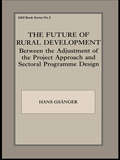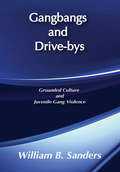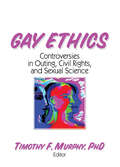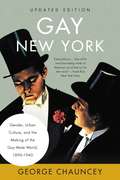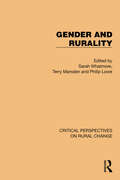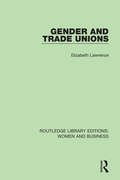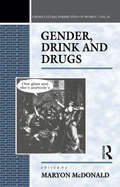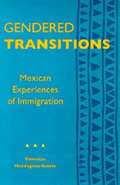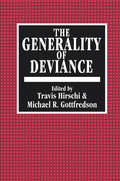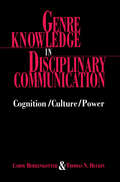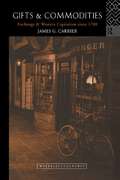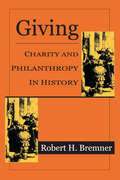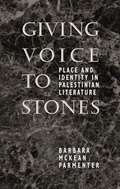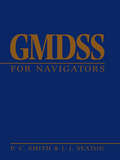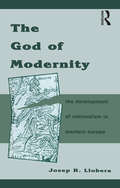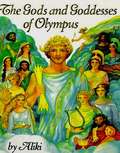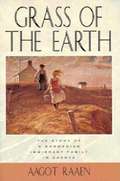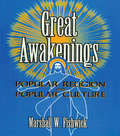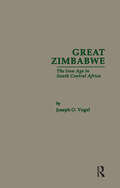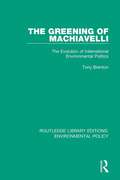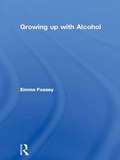- Table View
- List View
Full-Service Schools: A Revolution in Health and Social Services for Children, Youth, and Families
by Joy G. DryfoosFull-Service Schools portrays the movement to create a range of integrated support services in schools that respond to the declining welfare of many American families. and the rising "new morbidities'' of sex, drugs, violence, and stress among youth.
The Future of Rural Development: Between the Adjustment of the Project Approach and Sectoral Programme Desig
by Hans GsangerThis book gives a practitioner's account of international experiences with rural development seen from a German angle. It argues for a development co-operation for rural areas that actively supports popular participation, beneficiaries' self-organization, decentralization and, consequently, smaller self-managed (para)projects rather than large, top-down organized rural development projects.
Gangbangs and Drive-Bys: Grounded Culture and Juvenile Gang Violence (Social Problems And Social Issues Ser.)
by William SandersThis study, based on quantitative and qualitative data gathered over a twelve-year period, takes its title from the two predominant styles of gang violence: 'drive-bys,' which have replaced 'rumbles' as the primary form of gang violence; and 'gang-bangs' - a generic term for other gang violence that includes assaults, knifings, and beatings.The author attempts to understand the situations in which a young man would drive up to another human being and, without further ado, blow his head off. By examining hundreds of such situations, and employing both structural and phenomenological analysis, Sanders explores the various configurations of gang violence.Gangbangs and Drive-bys also examines the routines of gang members and their view of life, the different styles of gangs, and changes undergone by gangs from the early 1980s to the end of the same decade. Over that period, the emphasis shifted from parties and paybacks to big money from the sale of rock cocaine, and from unstructured to organized crime. Along with that shift came an increase in the violence.Finally, Sanders traces the beginning and evolution of a metropolitan police gang unit over the same decade in order to present an inside view of how the police attempt to deal with and understand gangs.
Gay Ethics: Controversies in Outing, Civil Rights, and Sexual Science
by Timothy F MurphyGay Ethics is an anthology that addresses ethical questions involving key moral issues of today--sexual morality, outing, gay and lesbian marriages, military service, anti-discrimination laws, affirmative action policies, the moral significance of sexual orientation research, and the legacy of homophobia in health care. It focuses on these issues within the social context of the lives of gay men and lesbians and makes evident the ways in which ethics can and should be reclaimed to pursue the moral good for gay men and lesbians.Gay Ethics is a timely book that illustrates the inadequacies of various moral arguments used in regard to homosexuality. This book reaches a new awareness for the standing and treatment of gay men and lesbians in society by moving beyond conventional philosophical analyses that focus exclusively on the morality of specific kinds of sexual acts, the nature of perversion, or the cogency of scientific accounts of the origins of homoeroticism. It raises pertinent questions about the meaning of sexuality for private and public life, civics, and science. Some of the issues covered: Sexual Morality Outing Same-Sex Marriage Military Service Anti-Discrimination Laws Affirmative Action Policy The Scientific Study of Sexual Orientation Bias in Psychoanalysis Homophobia in Health CareGay Ethics presents a wide range of perspectives but remains united in the common purpose of illuminating moral arguments and social policies as they involve homosexuality. The chapters challenge social oppression in the military, civil rights, and the social conventions observed among gay men and lesbians themselves. This book is applicable to a broad range of academics working in gay and lesbian studies and because of its current content, is of interest to an educated lay public. It will be a standard reference point for future discussion of the matters it addresses.
Gay New York: Gender, Urban Culture, and the Making of the Gay Male World, 1890-1940
by George ChaunceyGay New York brilliantly shatters the myth that before the 1960s gay life existed only in the closet, where gay men were isolated, invisible, and self-hating. Based on years of research and access to a rich trove of diaries, legal records, and other unpublished documents, this book is a fascinating portrait of a gay world that is not supposed to have existed.
Gays and the Military: Joseph Steffan versus the United States
by Joseph SteffanIn April 1987 Joseph C. Steffan, one of the ten highest ranking midshipmen in his class at the U.S. Naval Academy, and only six weeks from graduation, was denied his diploma and forced to resign his commission because he answered "Yes, sir" to the question, "I'd like your word, are you a homosexual?" Six years later his cause, and that of other gay men and lesbians seeking to serve their country by enlistment in the military, has become the subject of intense national controversy. This unusual and innovative work, based on the litigation strategy and court papers filed in the case of Joseph C. Steffan v. Richard Cheney, Secretary of Defense, et al., brings the resources of clinical psychiatry, clinical and social psychology, cultural history and political science to bear upon the fundamental questions at issue: How is sexual orientation determined? How and why have socially prejudiced stereotypes about male and female homosexuals developed? Why have gays faced special obstacles in defending themselves against discrimination? How much political power do gays have? Marc Wolinsky and Kenneth Sherrill argue that gays constitute a politically powerless class that has been unjustly deprived of its constitutional right to equal protection under the law. They have collected here the affidavits filed on behalf of Joseph Steffan in his suit against the United States government, together with the counter-arguments of the Department of Defense and the extraordinary opinion of the U.S. District Court for the District of Columbia. Whatever the outcome of the case, presently on appeal to the United States Court of Appeals for the District of Columbia Circuit, this book will stand as a lasting and indispensable guide to the sources of sexual discrimination.
Gender and Rurality (Critical Perspectives on Rural Change #6)
by Sarah Whatmore Terry Marsden Philip LoweOriginally published in 1994, this book brings together papers developing feminist analyses of the rural condition from a wide range of industrialised countries, informed by the national and local cultural constructions of gender and rurality which they interpret. The chapters address the gendered power relations of rural households and agricultural science; women’s mobilisation in farming and environmental politics; the intersection of domestic and rural values and practices as they shape gender identities.
Gender and Trade Unions (Routledge Library Editions: Women and Business #2)
by Elizabeth LawrenceThis book, first published in 1994, explores the impact of work and gender roles on union activism, and identifies factors that support and hinder women’s representation in trade unions. These issues are discussed in terms of gender role, work-related and union-related factors. The author details what trade unionists are doing to challenge inequalities that still exist, and identifies factors that divide and unite men and women within trade unions. The author shows the impact that feminism has had on the trade union movement and explores the extent to which men and women have similar priorities for collective bargaining.
Gender, Drink and Drugs (Cross-cultural Perspectives On Women Ser. #Vol. 10)
by Maryon McDonaldWhy do so many people feel compelled to drink alcohol or take drugs? And why do so many men drink and so many women refrain? Using ideas from social anthropology, this book attempts to provide a novel answer to these questions. The introduction surveys both gender and addiction. It points out that we cannot say what men or women are really like, in any culturally innocent sense, for gender is always, even in the realm of biology, a cultural matter. The ethnographic chapters, ranging from Ancient Rome to modern Japan, similarly suggest how any substance - from alcohol to tea to heroin - inevitably takes its meaning or reality in the cultural system in which it exists.This book will be of interest to medical anthropologists, medical sociologists, anyone with an interest in the contemporary direction of anthropology as well as those working in the fields of alcohol and addiction.
Gendered Transitions: Mexican Experiences of Immigration
by Pierrette Hondagneu-SoteloThe momentous influx of Mexican undocumented workers into the United States over the last decades has spurred new ways of thinking about immigration. Pierrette Hondagneu-Sotelo's incisive book enlarges our understanding of these recently arrived Americans and uncovers the myriad ways that women and men recreate families and community institutions in a new land. Hondagneu-Sotelo argues that people do not migrate as a result of concerted household strategies, but as a consequence of negotiations often fraught with conflict in families and social networks. Migration and settlement transform long-held ideals and lifestyles. Traditional patterns are reevaluated, and new relationships--often more egalitarian--emerge. Women gain greater personal autonomy and independence as they participate in public life and gain access to both social and economic influence previously beyond their reach. Bringing to life the experiences of undocumented immigrants and delineating the key role of women in newly established communities, Gendered Transitions challenges conventional assumptions about gender and migration. It will be essential reading for demographers, historians, sociologists, and policymakers. "I've opened my eyes. Back there, they say 'no.' You marry, and no, you must stay home. Here, it's different. You marry, and you continue working. Back in Mexico, it's very different. There is very much machismo in those men."--A Mexican woman living in the United States.
The Generality of Deviance
by Travis Hirschi Michael R. GottfredsonFirst Published in 2018. Routledge is an imprint of Taylor & Francis, an Informa company.
Genre Knowledge in Disciplinary Communication: Cognition/culture/power
by Carol Berkenkotter Thomas N. HuckinAlthough genre studies abound in literary criticism, researchers and scholars interested in the social contexts of literacy have recently become interested in the dynamic, rhetorical dimensions of speech genres. Within this burgeoning scholarly community, the authors are among the first researchers working within social science traditions to study genre from the perspective of the implicit knowledge of language users. Thus, this is the first sociocognitive study of genre using case-study, naturalistic research methods combined with the techniques of rhetorical and discourse analysis. The term "genre knowledge" refers to an individual's repertoire of situationally appropriate responses to recurrent situations -- from immediate encounters to distanced communication through the medium of print, and more recently, the electronic media. One way to study the textual character of disciplinary knowledge is to examine both the situated actions of writers, and the communicative systems in which disciplinary actors participate. These two perspectives are presented in this book. The authors' studies of disciplinary communication examine operations of systems as diverse as peer review in scientific publications and language in a first grade science classroom. The methods used include case study and ethnographic techniques, rhetorical and discourse analysis of changing features within large corpora and in the texts of individual writers. Through the use of these techniques, the authors engaged in both micro-level and macro-level analyses and developed a perspective which reflects both foci. From this perspective they propose that what micro-level studies of actors' situated actions frequently depict as individual processes, can also be interpreted -- from the macro-level -- as communicative acts within a discursive network or system. The research methods and the theoretical framework presented are designed to raise provocative questions for scholars, researchers, and teachers in a number of fields: linguists who teach and conduct research in ESP and LSP and are interested in methods for studying professional communication; scholars in the fields of communication, rhetoric, and sociology of science with an interest in the textual dynamics of scientific and scholarly communities; educational researchers interested in cognition in context; and composition scholars interested in writing in the disciplines.
Gifts and Commodities: Exchange and Western Capitalism Since 1700 (Material Cultures)
by James G. CarrierThree hundred years ago people made most of what they used, or got it in trade from their neighbours. Now, no one seems to make anything, and we buy what we need from shops. Gifts and Commodities describes the cultural and historical process of these changes and looks at the rise of consumer society in Britain and the United States. It investigates the ways that people think about and relate to objects in twentieth-century culture, at how those relationships have developed, and the social meanings they have for relations with others. Using aspects of anthropology and sociology to describe the importance of shopping and gift-giving in our lives and in western economies, Gifts and Commodities: * traces the development of shopping and retailing practices, and the emergence of modern notions of objects and the self * brings together a wealth of information on the history of the retail trade * examines the reality of the distinctions we draw between the impersonal economic sphere and personal social sphere * offers a fully interdisciplinary study of the links we forge between ourselves, our social groups and the commodities we buy and give.
Giving: Charity and Philanthropy in History
by Robert H. Bremner"According to Greek mythology mankind's first benefactor was the Titan, Prometheus, who gave fire, previously the exclusive possession of the gods, to mortal man." With these words the esteemed scholar Robert Bremner presents the first full-fledged history of attitudes toward charity and philanthropy. 'Giving' is a perfect complement to his earlier work The Discovery of Poverty in the United States. The word 'philanthropy' has been translated in a variety of ways: as a loving human disposition, loving kindness, love of mankind, charity, fostering mortal man, championing mankind, and helping people. Bremner's book covers all of these meanings in rich detail. Bremner describes the ancient world and classical attitudes toward giving and begging; Middle Ages and early modern times, emphasizing hospitals and patients and donors and attributes of charity; the eighteenth century and the age of benevolence; the nineteenth century and the growth of the concept of public relief and social policy; and a careful multiple chapter review of the twentieth century. Bremner reviews the act of giving in such comparative contexts as London, England and Kasrilevke, Russia with such figures as Thomas Carlyle, Charles Dickens, and Sholem Aleichem, as well as the more familiar wealthy industrialist/philanthropists, forming part of the narrative. The final chapters bring the story up to date, discussing the relationships of modem philanthropy and organized charity, and the uses of philanthropy in education and the arts. Bremner has an astonishing knowledge of the cultural context and the economic contents of philanthropy. As a result, this volume is intriguing as well as important history, written with lively style and wit. Whether the reader is a professional in the so-called "third stream" or "independent sector," or simply a citizen wondering just what the act of giving and the spirit of receiving is all about, 'Giving' will be compelling reading.
Giving Voice to Stones: Place and Identity in Palestinian Literature
by Barbara Mckean Parmenter"A struggle between two memories" is how Palestinian poet Mahmud Darwish describes the conflict between Palestinians and Israelis. Within this struggle, the meanings of land and home have been challenged and questioned, so that even heaps of stones become points of contention. Are they proof of ancient Hebrew settlement, or rubble from a bulldozed Palestinian village? The memory of these stones, and of the land itself, is nurtured and maintained in Palestinian writing and other modes of expression, which are used to confront and counter Israeli images and rhetoric. This struggle provides a rich vein of thought about the nature of human experience of place and the political uses to which these experiences are put. In this book, Barbara McKean Parmenter explores the roots of Western and Zionist images of Palestine, then draws upon the work of Darwish, Ghassan Kanafani, and other writers to trace how Palestinians have represented their experience of home and exile since the First World War. This unique blending of cultural geography and literary analysis opens an unusual window on the struggle between these two peoples over a land that both divides them and brings them together.
Glory and Hope: Inaugural Speech May 10, 1994
by Nelson MandelaSummary: "Glory and Hope" By Nelson Mandela "Glory and Hope" was Nelson Mandela's 1994 inaugural speech as the first democratically elected State President of South Africa. At the time, South Africa was in a rough transition from a system of Apartheid with segregation of people based on race and class divisions to a system with renewed hope for equality to all of their citizens. As the first democratically elected State President of South Africa, Nelson Mandela planned to ease the transition, giving the Africans a sense of pride and security; this speech is the first example of his effort. Reading this speech, the reader encounters lines that tell of pride, passion, and devotion. They realize that Nelson Mandela wrote the speech with his heart rather than with his mind. After tough times, Mandela is not ashamed of his land and believes that with hard work and patience from the citizens of South Africa, they can "reinforce humanity's belief in justice, strengthen its confidence in the nobility of the human soul and sustain all hopes of a glorious life for all,"(Glory and Hope by Nelson Mandela).
GMDSS for Navigators
by Peter Smith John SeatonThe Global Maritime distress and Safety System (GMDSS) is becoming the all-embracing term for communication and data transfer between ship and shore, and ship and ship. It's a highly automated system of terrestrial satellite communications technology whose primary role is to maintain safety of life at sea. Within the next five years all vessels over 300 tonnes will be required to carry GMDSS equipment. The seafaring nations of the world have together established the rules and regulations for good working practices within the system, and every serving and future navigating officer will be required to hold the GMDSS General Operator's Certificate. GMDSS for Navigators brings together in one publication the knowledge required by anyone who wants to become a qualified and competent operator of GMDSS communications equipment. It should prove to be the accepted universal reference for GMDSS training.
The God of Modernity: The Development of Nationalism in Western Europe (European Studies)
by Josep R. LloberaThis book provides an integrated framework for explaining how nationalism has become one of the most powerful ideologies of modern times. Starting with a consideration of the medieval roots of the nation, the author goes on to examine the various approaches and structural theories which have been used to explain the development of nationalism. In so doing, he highlights the key role of cultural and political influences, as well as the impact of the French Revolution and its aftermath. Clearly written with concise, self-contained chapters, this book will be of interest to undergraduates taking a range of social science and history courses as well as specialist readers.
The Gods and Goddesses of Olympus
by AlikiThis is the story of the mightiest of the gods and goddesses who lived in a golden palace on Olympus.
Grass of the Earth: Immigrant Life in the Dakota Country
by Aagot RaaenThis is an engaging, richly detailed biography of a family of Norwegian immigrant homesteaders in eastern North Dakota in the late 1800s.
Great Awakenings: Popular Religion and Popular Culture
by Frank Hoffmann Marshall Fishwick Beulah B RamirezAs religious fervor grows, Dr. Fishwick, a recipient of the Ray and Pat Browne Award for Lifetime Achievement from The American Culture Association, takes a sweeping look at religion in the United States--the country with the highest church attendance in the Western world. Popular religion can take many shapes and forms. It can wax and wane, but it cannot be eliminated or ignored. That is what prompted him to write Great Awakenings: Popular Religion and Popular Culture.He ponders how religion affects American life and popular culture, and why religion has become a major force in contemporary politics. How has the Electronic Revolution furthered the religious right? What does popular religion tell us about popular culture? And about our faith?He identifies and explores five great religious revivals or “Great Awakenings:” the Atlantic Seaboard Awakening the Urban Awakening the Modernist Awakening the Celebrity Preacher Awakening the Electronic AwakeningFishwick explores the current events preceding and during each awakening, its leaders, followers, and critics. Great Awakenings gives a new understanding of the American religious past and leaves us with an anticipation for the next great awakening.
Great Zimbabwe: The Iron Age of South Central Africa
by Joseph O. VogelFirst Published in 1994. This research guide was written as a comprehensive, though by no means exhaustive, survey of the literature pertinent to studying the indigenous complex societies of south central Africa. Although the paramount focus of the compilation was the archaeology of Great Zimbabwe, the author has drawn from a broad geographical area and a wider period of time than that usually associated with Zimbabwean culture in order to demonstrate the cultural background for the growth of monumental trading towns in south central Africa.
Green History: A Reader in Environmental Literature, Philosophy and Politics
by Derek WallGreen History traces the development of ecological writing through history and forms a broad critical review of green ideas and movements reinforcing the importance of environmental concern and action in our own time. Animal rights, ecology as science, feminism, green fascism/socialism/anarchism, land reform, peaceful protest, industrialization, ancient ecology, evolution, grassroots activism, philosophical holism, recycling, Taoism, demographics, utopias, sustainability, spiritualism ...all these issues and many more are discussed. Authors include Alice Walker on massacre in the City of Brotherly Love, Aldous Huxley on progress, Lewis Mumford on the organic outlook, Engels on natural dialectics, Thoreau on the fontier life, the Shelleys on vegetarianism and playing God, Bacon on the New Atlantis, Hildegard of Bingen on green vigour, the unknown writer of the Bodhisattva and the Hungry Tigress and Plato on soil erosion. Each article is set within its historical and thematic context. A full introduction and a guide to further reading are also provided.
The Greening of Machiavelli: The Evolution of International Environmental Politics (Routledge Library Editions: Environmental Policy #4)
by Tony BrentonFirst published in 1994. Environmental issues present a daunting challenge to the international system. The destruction of the tropical rainforest, the Chernobyl explosion and the ozone layer ‘hole’ all underline the transnational nature of environmental threats and the need for states to act together in order to tackle them. How have such environmental issues entered political agendas in different parts of the world and how has that affected national positions? Can governments ever reconcile their own national interests with the international cooperation needed to deal with transboundary issues such as climate change? This book traces the history of international environmental negotiations and regulations and looks at the domestic policies upon which cooperation in the international community depends. It covers some major milestones in recent history, from the Torrey Canyon accident through to the Rio ‘Earth Summit’ and the emergence of the European Community as a major international environmental actor. It also looks at cross-cutting issues such as the role of non-governmental organizations, the environmental impacts of world agriculture and trading arrangements, industry’s attitudes, and the relationship between democracy and environmental protection. It concludes by examining how the international system has adapted, and may adapt further, to deal effectively with environmental problems, and reflects on the implications of this for the future.
Growing up with Alcohol
by Emma FosseyThe use and misuse of alcohol by young people is an established concern. Initiatives designed to educate the young about the potential dangers of alchol are frequently directed solely at teenagers. Growing up with Alcohol argues that this may be leaving it too late. Emma Fossey presents a detailed account of a study of children aged between five and ten years, carried out through a series of ingenious game-like activities. She explodes the myth that young children are ignorant about alcohol and provides valuable insights about how very young children learn about alcohol and about their early perceptions of alcohol. The study questions the effectiveness of past alcohol education and argues strongly that future initiatives should develop innovative and user-friendly alcohol education materials for use in primary as will as in secondary schools and colleges.

